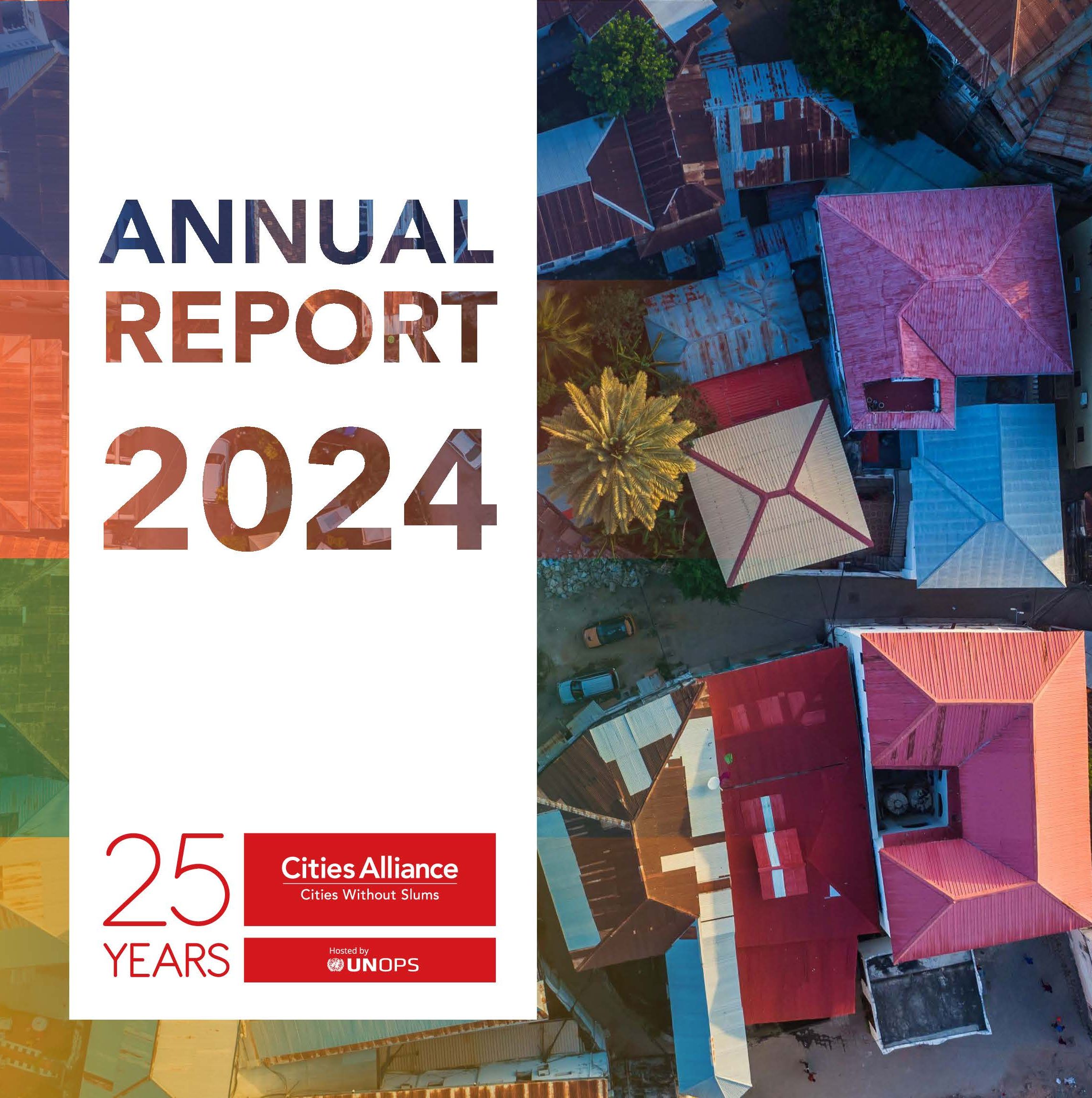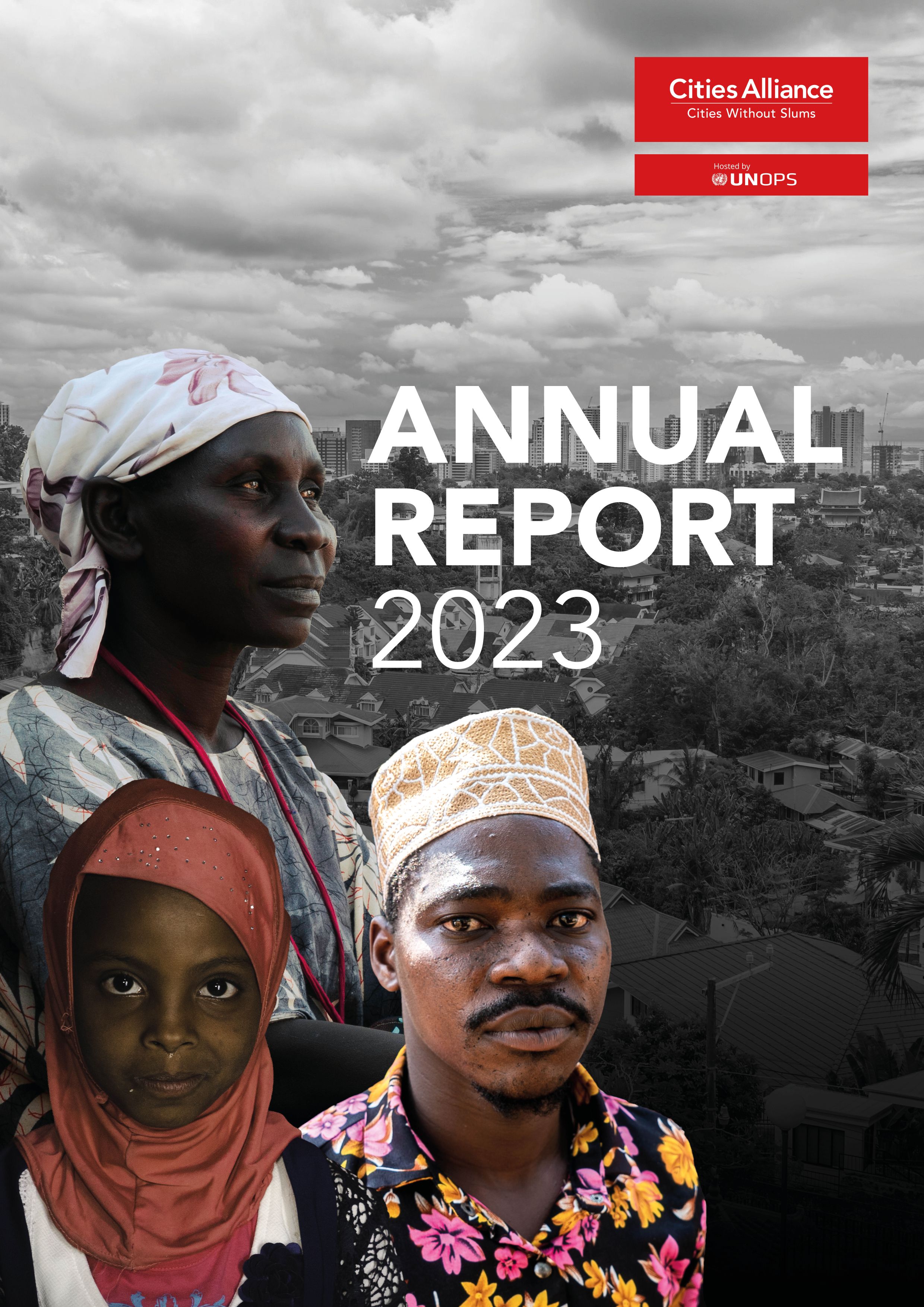- Who We Are
- How We Work
- Regional / Country Initiatives
- Legacy
- Core Themes
- Working Groups
- Portfolio & Results
- Newsroom
- Resources
Annual Report 2017
Download Executive Summary | Download Full Report
The year 2017 was a challenging, but ultimately highly rewarding one for Cities Alliance. In addition to implementing our annual work programme, we successfully closed four major pieces of work: Our World Bank legacy portfolio; the Land, Services and Citizenship grant from the Bill & Melinda Gates Foundation; the Intermediation Portfolio, which we managed on behalf of the Gates Foundation; and our Future Cities Africa initiative.
At the same time, Cities Alliance prepared for the next phase in its history with a new Strategic Plan 2018–21 that positions the Cities Alliance to play a key role in realising global agendas. It outlines a Mission, Vision and Strategic Objective for the partnership: To improve the lives of 20 million of the world’s urban poor and empower women in more than 60 cities across seven or more countries by 2021.
The plan also structures Cities Alliance’s activities within two windows: A Country/City window, and a Global window. Our work programme through 2021 focuses on four main themes: Equitable economic growth; resilience, cities and climate change; gender equality and women’s empowerment; and cities and migration.
Country Programmes
In 2017, Cities Alliance formally closed the Burkina Faso Country Programme, the last of our original five Land, Services and Citizenship programmes. We synthesised the lessons from this first tranche of programmes and began designing the second phase, in Liberia and Tunisia. We took the evidence and data collected through the Future Cities Africa programme and used that knowledge to enhance the new Country Programmes for a more coherent approach.
Burkina Faso
The programme is widely viewed as a success and has been recognised within Burkina Faso as influential at all three levels (national, local and community). An audit by the prime minister’s office gave the Country Programme the highest possible rating for results. Highlights include:
- A framework to guide Burkina Faso’s urban development that is in line with its national development strategy.
- National and municipal urban forums have generated concrete results and become effective platforms for consultation towards inclusive urban policy, planning, and governance.
- Community-led infrastructure projects have brought dynamism to communities, which are now better able to organise themselves and are recognised by local authorities.
Liberia
Nearly two years into implementation, the Liberia Country Programme has fostered a real recognition at the national level that developing the national economy means having efficient and effective cities, which in turn require mechanisms for mobilising capacities and engaged citizenship. Slum dwellers are being recognised as residents of the city who need to be fully engaged in its planning and development, while petty traders are increasingly viewed as contributors to the economy instead of nuisances.
Highlights of 2017:
- A Slum Upgrading Unit established within the National Housing Authority (NHA) that recognises the need to work in slums, provide housing solutions to low-income families, and take the needs of the urban poor into consideration in national planning.
- The first-ever Greater Monrovia City Urban Forum established a consensus on a city development strategy process for the metropolitan area that includes the voice of all residents.
- An agreement was reached between the police, local authorities and petty traders around Monrovia’s main central market that allows the traders to practice their trade without harassment.
- Community profiling of 60 informal settlements has provided valuable data that will be used to inform community-led small infrastructure projects.
- In December, the European Union announced that it would provide $7 million (EUR 5.9 million) in funding for two projects on Primary Waste Collection, Solid Waste Management, and Waste-to-Energy options for Greater Monrovia, thus expanding the Country Programme.
Tunisia
The Country Programme supports Tunisia’s cities to build their capacity for strategic urban planning and city management, with special emphasis on lagging inland cities. Many different organisations are active in Tunisia, and the Country Programme has stood out by building coherence of effort and bringing these various stakeholders and groups together for more effective engagement.
Highlights of 2017:
- The Madinatouna city development strategy (CDS) initiative supports strategic city planning in eight secondary cities. A ninth city, La Soukra, used its own funds to join the process. All the cities have concluded the initial diagnostic phase of the CDS process and begun the second phase to agree on strategic thrusts. The Ministry of Local Affairs and Environment is seeking to mobilise funds to bring two more cities into the initiative, and it has closely linked the project to the national sustainable cities programme.
- The World Bank is leading a study on the role cities play in regional development that focuses primarily on disadvantaged regions. The findings will be used to plan future interventions.
Catalytic Fund
With the new Strategic Plan 2018–21, the Catalytic Fund will transition into a broader innovation programme and Fund. The Catalytic Fund has been a useful instrument that has adapted over the years, and it has generated a diverse portfolio of projects that have catalysed urban transformation, created partnerships among development actors, and leveraged funding.
Joint Work Programmes
In 2017 the Cities Alliance had four active JWPs: Promoting Equitable Economic Growth in Cities, Cities in the Global Agendas, Resilient Cities, and Gender and Women’s Empowerment. A fifth JWP on Migration and Cities is expected to launch in 2018.
Cities in the Global Agendas
This JWP embodies the partnership’s clear commitment to the global agendas and their implementation in cities. It provides a space for members to come and discuss issues, such as how the urban dimension of the SDGs will be reviewed, how different stakeholder groups can participate, and the implementation process for the New Urban Agenda.
- In 2017, a framework document was completed outlining the main activities and focus areas. It establishes two main priorities: promoting national urban policies and using citizen-generated data in reporting for the global agendas.
- The JWP produced knowledge products to support its advocacy on why engaging cities is important and how it can be done based on solid evidence, including Local and Regional Governments in the Follow-up and Review of Global Sustainability Agendas, which looks at how different stakeholders can be involved in the follow-up and review process of the global agendas.
Equitable Economic Growth in Cities
This JWP aims to learn more about how public services can foster equitable economic growth, especially in secondary cities. In 2017, it moved out of the preparatory phase and into its first real year of implementation. A highlight has been the rollout of the Campaign Cities initiative in three pilot countries and six secondary cities: Sylhet and Narayanganj in Bangladesh, Agona Swedru West and Cape Coast in Ghana, and Mbale and Gulu in Uganda. With the Campaign Cities, JWP members work with cities in partner countries to support local initiatives that promote equitable access to public goods and services.
The results have been visible and positively received on the ground, and the methodology used in the initiative has generated excitement among local authorities and development partners.
The JWP produced knowledge products to explore the relationship between access to public services and economic growth, including a draft global report on public space and a report on gender and access to public services.
Resilient Cities
This JWP has helped to place Cities Alliance at the centre of the resilience debate, with its emphasis on partnership and knowledge. Activities included preparation for CitiesIPCC, a groundbreaking conference that brought scientists and urban practitioners together around the isssue of cities and climate change for the first time. Grants included:
- A grant to ICLEI – Local Governments for Sustainability to support its Transformative Action Program, which aims to accelerate the implementation of local action to tackle climate change. The grant helped identify robust city resilience projects and linking them to appropriate funding mechanisms.
- Funding to the World Resources Institute (WRI) to work on Urban Community Resilience Assessments (UCRAs), a tool that takes resilience planning to the neighbourhood level. It was successfully piloted in Rio de Janeiro, Brazil, and the Cities Alliance grant allowed the UCRA process to be expanded to Surat, India and Semarang, Indonesia.
- A grant to C40 to improve the CURB tool’s approach to informal settlements and apply it in Accra, Ghana; Dhaka, Bangladesh; Dakar, Senegal; Quezon City, Philippines; Quito, Ecuador; and Santiago, Chile. CURB is an interactive scenario planning tool designed specifically to help cities take action on climate change.
Gender and Women’s Empowerment
This JWP provides a platform for promoting the role of women in development and focuses on mainstreaming gender within the Cities Alliance work programme. Significant progress was made in that area. From 2016 to 2017, mainstreaming gender in our grants improved by 158 per cent; in 2006, one-third of our projects discussed gender equality or women’s empowerment: By 2017 that number had risen to 54 per cent. As of 2017, no grant can be approved without a minimum threshold regarding gender mainstreaming.
Regional Programmes
In Asia, we supported implementation of two activities:
- A Cities Enabling Environment (CEE) Ratings assessment that takes the approach piloted in Africa and adapts it to Asia. It assesses the city and local government enabling environment in 28 countries and helps local governments identify and address gaps in policy, legal and institutional frameworks that are impacting their efficiency.
- The Heritage Cities Development and Augmentation Scheme (HRIDAY), which helps cities integrate cultural heritage with city development and local economic development in a way that brings better service and livelihood opportunities. Activities in 2017 focused on advocacy and negotiation with the government of Rajasthan on guidelines for a heritage development programme and testing the approach with the cities of Jodhpur and Nawalgarh.
In Latin America and the Caribbean, the Cities Alliance has focused on supporting the implementation process of the New Urban Agenda in the region. Highlights of 2017 include development of the Urban Housing Practioners’ Hub (UHPH), a regional network for urban housing practitioners that connects them with policy planning; and technical assistance for national policies in Paraguay and Jamaica.
Cities Alliance also produced two knowledge products: An overview of national urban laws in Latin America and the Caribbean: case studies from Brazil, Colombia and Ecuador, which maps out all the urban legal frameworks in LAC; and URBfavela, a Portuguese-language publication that captures the learning from a national conference on slum upgrading in Brazil.


